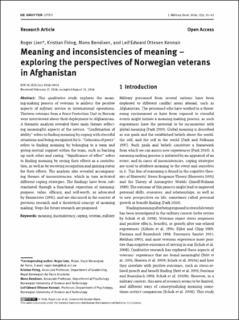| dc.description.abstract | Military personnel from several nations have been deployed to different conflict areas abroad, such as Afghanistan. The personnel who have worked in a threatening environment or have been exposed to stressful events might initiate a meaning-making process, as such experiences have the potential to be inconsistent with global meaning (Park 2010). Global meaning is described as our goals and the established beliefs about the world, the self, and the self in the world (Park and Folkman 1997). Such goals and beliefs constitute a framework from which we can assess new experiences (Park 2010). A meaning-making process is initiated by an appraisal of an event, and in cases of inconsistencies, coping strategies are used to attribute meaning to the event and ourselves in it. This line of reasoning is found in the cognitive theories of Horowitz’ Stress Response Theory (Horowitz 2001) and the Theory of Assumptive Worlds (Janoff-Bulman 1989). The outcome of this process might lead to improved personal skills, resources, and relationships, as well as to new perspectives on life, sometimes called personal growth or benefit finding (Park 2010).
Finding meaning after being exposed to stressful events has been investigated in the military context (refer review by Schok et al. 2008). Veterans report stress responses and positive effects, benefits, or growth after war-related experiences (Aldwin et al. 1994; Elder and Clipp 1989; Fontana and Rosenheck 1998; Forsvarets Sanitet 2013; Mehlum 1995), and most veterans experience more positive than negative outcomes of serving in war (Schok et al. 2008). Qualitative research has explored those aspects of veterans' experience that are found meaningful (Britt et al. 2001; Mooren et al. 2009; Schok et al. 2010a) and how they correlate with positive outcomes, such as stress-related growth and benefit finding (Britt et al. 2001; Fontana and Rosenheck 1998; Schok et al. 2010b). However, in a military context, this area of research seems to be limited, and different ways of conceptualizing meaning sometimes restrict comparison (Schok et al. 2008). This study explores the aspects of service that veterans find meaningful after being redeployed from Afghanistan. Moreover, it explores inconsistencies in appraisal of meaning that activate coping strategies in order to attribute new meaning to such events. | en_US |

